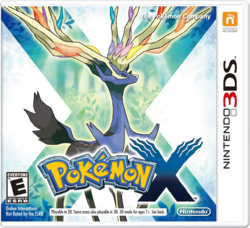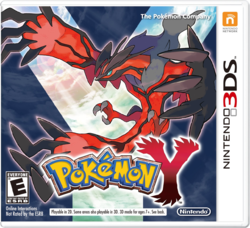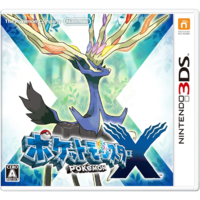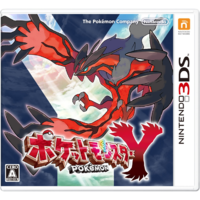Pokémon X and Y
| Pokémon X ポケットモンスターX | |
|---|---|
 Pokémon X's boxart, featuring Xerneas | |
| Pokémon Y ポケットモンスターY | |
 Pokémon Y's boxart, featuring Yveltal | |
Basic info
| |
| Platform: | Nintendo 3DS |
| Category: | RPG |
| Players: | 1-4 players simultaneous |
| Connectivity: | 3DS Wireless, StreetPass, SpotPass, Nintendo Network, IR |
| Developer: | Game Freak |
| Publisher: | Nintendo/The Pokémon Company |
| Part of: | Generation VI |
Ratings
| |
| CERO: | A |
| ESRB: | E |
| ACB: | PG |
| OFLC: | PG |
| PEGI: | 7 |
| GRAC: | ALL |
| GSRR: | 6+ |
Release dates
| |
| Japan: | October 12, 2013[1] |
| North America: | October 12, 2013[2] |
| Australia: | October 12, 2013[3] |
| Europe: | October 12, 2013[4] |
| South Korea: | October 12, 2013[5] |
| Hong Kong: | October 12, 2013[6] |
| Taiwan: | October 12, 2013[7] |
Websites
| |
| Japanese: | Official Japanese site Nintendo.co.jp |
| English: | Pokémon.com Nintendo.com (Pokémon X) Nintendo.com (Pokémon Y) Official English site |
|
Japanese boxart
| |
Pokémon X (Japanese: ポケットモンスターX Pocket Monsters X) and Pokémon Y (Japanese: ポケットモンスターY Pocket Monsters Y) are the primary paired versions of Generation VI. The games are available on the Nintendo 3DS. The games take place in the new Kalos region.
Announced on January 8, 2013 at 8 pm JST during a worldwide announcement by Satoru Iwata through Nintendo Direct, the paired versions were released worldwide (except for select countries) on October 12, 2013 and are available for both retail sale and download.[8] All copies of the game are playable in all seven of the languages that the Pokémon games are released in: Japanese, English, German, Spanish, French, Italian, and Korean.
Plot

|
This plot summary is incomplete. Please feel free to edit this plot summary to add missing sections and complete it. |
Waking up in his/her bedroom, the player heads downstairs and is greeted by their mother who tells them to go change out of their pajamas. After doing so, their mother encourages the player to go outside and talk to their neighbor. From there, the neighbor, Serena, if the player is male, or Calem, if the player is female, remarks that Professor Sycamore has a task for five kids, including the player character. The neighbor also adds that they are surprised that the Professor knows who the player is. Also, Shauna introduces herself and tells the player that she and the player's neighbor will wait for the player in Aquacorde Town.
Once the player leaves their hometown, they go north on Route 1 and arrive in Aquacorde Town, where Shauna calls the player over. Serena/Calem then introduces both Trevor and Tierno and Shauna, Trevor, and Tierno all come up with their own ideas for a nickname for the player. If the player does not like any of these, then they can choose to make their own nickname. From then on, Shauna, as well as Trevor and Tierno from time to time, will address the player character by the selected nickname. Tierno then allows the player to choose a starter Pokémon, Fennekin, Froakie, or Chespin. After the player chooses their starter, Shauna will choose the Pokémon that is weak to the player's starter and Serena/Calem will take the Pokémon that is strong against the player's starter, in traditional rival fashion. Trevor presents the player with a Pokédex, and Tierno gives the player the Prof's Letter to take to their mother. However, before the player can leave Aquacorde Town, Shauna challenges the player to a battle.
The player defeats Shauna and, after she heals the player's Pokémon, the player returns to Vaniville Town and gives the Prof's Letter to their mother. The player's mother welcomes the player back, congratulates them on receiving a starter Pokémon, and then gives them a Town Map. The player leaves, only to be stopped by their mother's Rhyhorn. Their mother comes out and explains that the Rhyhorn only wanted to give the player a send-off. From there, the player goes north once more, passing through Aquacorde Town on their way to Santalune City, which is accessed by travelling along Routes 2 and 3 and making it through Santalune Forest. Upon arrival in Santalune City, the player must battle a Trainer who is standing in front of the entrance to the town's Gym. Once the player defeats that Trainer, they receive the Roller Skates from the Trainer and can now challenge the Santalune City Gym. If the player defeats the Santalune City Gym Leader, Viola, then they will receive the Bug Badge from her and her sister, Alexa, will let the player pass on to Route 4, as well as give the player the Exp. Share.
As the player reaches the gate to Lumiose City, they meet Sina and Dexio who discuss the Pokémon Flabébé and the new Fairy type. When the player first reaches Lumiose City, they cannot do much because of a power outage. They go to Professor Sycamore's lab and soon afterwards everyone arrives. He encourages them to be the best trainer they can be. Everyone battles each other and he battles the player with the first stage of the Kanto Starters. Afterwards, he lets the player choose one. The others choose one although the do not use them on their teams. When the player goes down to the ground floor they see Dexio with Lysandre about the potential the Professor's pupils have. He says he desires a beautiful world and leaves the building, the friends come to the player, Serena wants to go to Cafe Soleil and Tierno directs the player to Cafe Soleil and Camphrier Town.
In Cafe Soleil, Lysandre is talking to Diantha, an established Kalos actress. He asks her if she wants to remain young and beautiful forever, but she dismisses the question and says that she looks forward to playing more roles as she gets older. After Lysandre leaves, she tells the player that she is a trainer and battles in her spare time. She says that she looks forward to battling them and leaves the Cafe.
Blurb
The next evolution in Pokémon!
New Pokémon!
Explosive 3D battles!
Explore a majestic new region!
New Features: Pokémon-Amie and Super Training!
Connect instantly with players all over the world!
Features
3D compatible gameplay
Unlike previous games in the main series, Pokémon X and Y feature a three dimensional style of gameplay, and 3D modeled cel-shaded characters and creatures are used, rather than sprites like has always been done in the main series. Stereoscopic 3D can be used in Single Battles, cutscenes, specific areas, and under some special circumstances; otherwise, stereoscopic 3D is not usable. The battle system is aesthetically overhauled, featuring more lively reactions to the attacks, such as when a Pokémon is being hit.
Name changes
- Main article: List of modified moves → Name changes
In non-Japanese languages, many move and item names are now spelled or formatted differently. For example, ThunderShock is now formatted as Thunder Shock and Faint Attack is now spelled Feint Attack.
Transportation
Players can now walk on an 8 directional grid, allowing diagonal movement, as opposed to the four way grid in previous games.
The player now has the ability to rollerskate, at least under certain conditions, and can also free roam on no grid. This also works with the bike. The player can use the roller skates and can grind to overcome obstacles. Skiddo, Mamoswine, and Rhyhorn can be ridden in certain locations and allow the player to interact with the environment, by destroying rocks and crossing broken paths. Gogoat can also be ridden, although only around Lumiose City in a set path.
Player Search System
- Main article: Player Search System
The Player Search System (PSS) is a multiplayer feature that allows people to connect, battle, and trade with other players through the internet. It uses the bottom screen and allows the player to search for other people playing both globally and locally.
Pokémon-Amie
- Main article: Pokémon-Amie
Pokémon-Amie is a new feature that allows the player to develop stronger bonds with their Pokémon. It uses the touch screen to allow players to pet, feed, and play with Pokémon currently on their team. Players may interact with their Pokémon by petting or feeding them via the touchscreen or mimicking their movements using the camera.
Sky Battles
- Main article: Sky Battle
Sky Battles are battles which are restricted to Flying Pokémon, although some Pokémon with Levitate can enter. These airborne battles take place against Trainers standing far away, such as on cliffs.
Horde Encounters
- Main article: Horde Encounter
It is now possible to encounter several wild Pokémon at once. Up to five wild Pokémon will battle against one of the player's Pokémon. These battles offer a lot of experience. Some attacks, such as Rock Slide, are shown to hit all five of the opposing Pokémon. However, the player's Pokémon must withstand attacks from all five of the opposing Pokémon each turn.
Super Training
- Main article: Super Training
Super Training is a new method of quickly and easily increasing a Pokémon's EVs.
Fairy type
- Main article: Fairy (type)
One new type has been introduced, the Fairy type. This type was added to balance the Dragon type, which was previously only weak to itself and Ice. Fairy-type attacks are strong against Dragon, Fighting, and Dark types and resisted by Fire, Poison, and Steel types; Fairy-type Pokémon are weak to Poison- and Steel-type attacks, resist Fighting-, Bug-, and Dark-type attacks, and are immune to Dragon-type attacks.
Trainer customization
- Main article: Trainer customization
The player will now be able to change their appearance in-game, allowing them to customize their characters by changing their hair color and clothing.
Gyms
X and Y feature Gyms just as every other main series title. In Kalos, the Gym Leaders are Viola (Bug), Grant (Rock), Korrina (Fighting), Ramos (Grass), Clemont (Electric), Valerie (Fairy), Olympia (Psychic), and Wulfric (Ice).
Elite Four and Champion
Just as in Unova, the Elite Four can be battled in any order. After battling all four, a path to the Champion is unlocked. The Elite Four members are Malva (Fire), Siebold (Water), Wikstrom (Steel), and Drasna (Dragon). After beating all four Elite Four members, the player will face the Champion, Diantha, who uses a variety of types along with a Gardevoir which can Mega Evolve.
Pokémon
72 new Pokémon were introduced for X and Y, bringing the known total from 649 to 721.
The first Pokémon to be revealed were Chespin, Fennekin, Froakie, Xerneas, and Yveltal on January 8, 2013.
Mega Evolution
- Main article: Mega Evolution
A unique state, Mega Evolution, was introduced in Pokémon X and Y. Mega Evolution is a temporary in-battle transformation that results in an overall increase in stats, sometimes also changing a Pokémon's Ability and types. Not all Pokémon can Mega Evolve. A Pokémon can only Mega Evolve if it is holding a Mega Stone in battle and its Trainer has a Key Stone.
Game-exclusive Pokémon
This list of game-exclusive Pokémon applies to the main game. Some of the Pokémon listed can be found in the Friend Safari regardless of version.
|
| ||||||||||||||||||||||||||||||||||||||||||||||||||||||||||||||||||||||||||||||||||||||||||||||||||||||||||||||||||||||||||||||||||||||||||||||||||||||||||||||||||||||||||||||||||||||||||||||||||||||||||||
Updated cries
Many Pokémon introduced prior to Pokémon X and Y received newer, more realistic cries upon its release. Some Pokémon, such as Corphish, Pikachu, and Shiftry, received drastically different cries from the originals.
Compatibility
Pokémon X and Y can connect with the Pokémon Global Link website. They are mostly compatible with Pokémon Omega Ruby and Alpha Sapphire, with the exception of alternate forms, Mega Evolutions, moves, or Abilities introduced in those games, which cannot be traded to or used in battle with X and Y. The games are also able to communicate with Pokémon Bank, which allows the storage of Pokémon. Through Pokémon Bank and Poké Transporter, X and Y are able to communicate indirectly with games from Generation V.
Reception
Gaming magazine Famitsu gave Pokémon X and Y a score of 39 out of 40.
The game sold more than four million copies during its first weekend on sale.[9][10] In the fiscal year of their release, they sold 12.26 million units.[11]
IGN rated the games an "Amazing" 9.0/10[12], praising its animation, characters, and multiplayer functionality, receiving the same score as Pokémon Black and White. Pokémon X and Y hold a rating of 87.26%[13] and 87.89%[14], respectively, on Game Rankings based on 45 reviews.
Music
- Main article: Pokémon X & Pokémon Y: Super Music Collection
The soundtrack contains most of the background music and effect music from the games. The music is composed by Shota Kageyama (Sound Director of Pokémon X and Y), Hitomi Satō, Minako Adachi, and Junichi Masuda. Pokémon X and Pokémon Y are the first main series titles since Pokémon Gold and Silver that Gō Ichinose did not work on as a composer, since he shifted to a side project of Game Freak's during the development of Pokémon X and Y.
Staff
- Main article: Staff of Pokémon X and Y
Version history
| Version | Release date | Official changelog | More information |
|---|---|---|---|
| 1.0 | October 12, 2013 | N/A | Initial release |
| 1.1 | October 25, 2013 |
|
Fix for the Lumiose City save glitch. |
|
Fix for the GTS filter error. | ||
| 1.2 | December 12, 2013 |
|
Fix for the Wonder Trade evolution learnset glitch. |
|
Fix for the Trainer PR Videos glitch. | ||
|
Encrypts battling and trading communications. This prevents the use of cheating programs such as Instacheck and Battle Analyzer, which intercept online traffic and read information such as Pokémon data and the opponent's decisions. As such, this patch is required to connect to the Nintendo Network in-game (unlike the previous patch). | ||
| 1.3 | October 26, 2014 |
|
Changes Poké Ball animation to a different style. |
| 1.4 | April 1, 2015 |
|
Initially caused the game to crash in battles between international players in Battle Spot Random Matchup, but no longer does after Battle Spot server was modified to display nicknames in such battles. |
| 1.5 | April 23, 2015 |
|
Development
- See also: Pokémon X and Y beta

|
This section is incomplete. Please feel free to edit this section to add missing information and complete it. |
According to Junichi Masuda in November 18, 2013, X and Y were in development for 3.5 years and involved more than 500 people if localization staff is included.[15]
Demonstration

|
This section is incomplete. Please feel free to edit this section to add missing information and complete it. Reason: When/where/how the demo was playable |
In the Pokémon X demo, the player is Calem; in the Pokémon Y demo, the player is Serena. The player starts with a random level 30 Kalos starter Pokémon, Helioptile, and Sylveon. Pokémon-Amie is constantly present on the touch screen while the player is in the overworld. Pokémon do not gain experience in the demo.
The player is welcomed by Alexa, and starts in an area with a large fountain in an area of decreased elevation, surrounded by small staircases leading to the fountain. Between the player's starting position and the fountain is tall grass.
In battle, the bag is divided into the same four categories it has been since Generation IV: HP/PP restore, status restore, Poké Balls, and battle items. The player starts off the demo with 10 Poké Balls, and can catch the wild Pokémon that appear.
At the fountain is a Skiddo, which the player can mount with A and dismount with B. As Skiddo cannot climb stairs, the player is restricted to the small area around the fountain.
Just past the fountain is the opposite-gendered player character. If the player interacts with him or her, he or she will challenge the player to a battle. He or she has the starter Pokémon that is super effective against the player's.
Past the fountain is a field of flowers. Wild Pokémon can be found while walking in flowers. A Fletchling can be seen walking in one of the patches of flowers. Past the field of flowers are several hedge mazes, each containing a Marill walking around that only makes its cry when interacted with. Shauna and Trevor are standing around in the general area. If the player interacts with Shauna, she will challenge the player to a battle. Shauna has the starter Pokémon with a type disadvantage to the player's.
Past these mazes is Professor Sycamore standing in front of a gate. If the player interacts with him, he will give the player a level 100 Mewtwo holding its Mega Stone with Psyshock, Thunderbolt, Shadow Ball, and Recover; the player loses access to their other Pokémon at this point. He then challenges the player to a battle with his Crobat, Dragonite, and Chandelure.
Chespin's moveset is Vine Whip, Leech Seed, Growl, and Rollout. Fennekin's moveset is Psybeam, Fire Spin, Tail Whip, and Flame Charge. Froakie's moveset is Water Pulse, Round, Quick Attack, and Lick.
Gallery
- Pokemon Y 3DS icon.png
Y Home Menu icon
Trivia
- These Pokémon games are named after the x and y-axes of the Cartesian coordinate system.[16]
- Although Game Freak released Pokémon X for the Nintendo 3DS in 2013, the tentative title (unconfirmed to be a codename for Crystal) for a game similar to the Japanese version of Pokémon Crystal with planned support to connect to a mobile phone and set for an April 2000 release was also Pocket Monsters X (ポケットモンスターX), according to multiple sources such as an Asahi Shimbun news article from December 1999.[17] The game was postponed until 2001 due to the planned release of the Game Boy Advance.[18] The article mentions an adapter for linking a Game Boy to a mobile phone, with the datacenter server used for the feature being hosted by Kyocera in Kyoto.
- These are the first core series games that do not have Version (or its equivalent in that language) in their Western language names.
- These are the only Nintendo-published games to be released on the same date worldwide,[19] as well as the only core series games to do so.
- However, the first trailers for Pokémon Omega Ruby and Alpha Sapphire showed that they were intended to be released worldwide sometime in November 2014, until the final trailers established that the games would be released in Europe on November 28, 2014 after their release in the rest of the countries on November 21 of that year.
- These Pokémon games have the shortest names using only one letter each (X and Y).
- These are the only games to have alternate names for routes, such as Vaniville Pathway (for Route 1), Avance Trail (for Route 2), etc.
- These are the only core series games after Pokémon Platinum to not play the game mascot's cry upon pressing START on the title screen, instead playing a generic confirmation sound.
- These are the first core series games not to have an introduction prior to the title screen. Instead, the introduction plays after the title screen animation.
- The Japanese logos for X and Y include the Mega Evolution sigil.
In other languages
| ||||||||||||||||||||||||
See also
External links
References
- ↑ Japanese Pokémon X and Y minisite (Japanese)
- ↑ Pokémon.com (US)
- ↑ Nintendo Australia
- ↑ Pokémon.com (UK)
- ↑ Korean Pokémon X and Y minisite (Korean)
- ↑ Hong Kong Pokémon X and Y minisite (Chinese)
- ↑ Taiwanese Pokémon X and Y minisite (Chinese)
- ↑ 『ポケットモンスター X・Y』ニンテンドー3DSで2013年10月、世界同時発売【画像追加】 (Japanese)
- ↑ Pokémon X and Y sales hit four million in two days | Eurogamer.net
- ↑ Pokémon X and Y Sales Figures Revealed | IGN
- ↑ Consolidated Results for the Years Ended March 31, 2012 and 2013
- ↑ http://www.ign.com/articles/2013/10/04/pokemon-x-and-y-review
- ↑ http://www.gamerankings.com/3ds/696959-pokemon-x/index.html
- ↑ http://www.gamerankings.com/3ds/696960-pokemon-y/index.html
- ↑ Masuda's blog post (Japanese) (English)
- ↑ Iwata Asks - Pokémon X and Y
- ↑ ネット最前線:ニュース
- ↑ ポケモン情報サイト「palette」過去ログ38 - ポケパレ!
- ↑ Famitsu

|
This game-related article is part of Project Games, a Bulbapedia project that aims to write comprehensive articles on the Pokémon games. |
















































